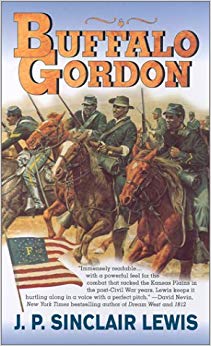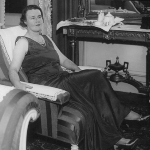Background
Sinclair Lewis was born in the United States, the grandson of Nobel laureate Sinclair Lewis and writer Dorothy Thompson.


(The first novel in an ambitious new series, a fictional h...)
The first novel in an ambitious new series, a fictional history of the West as seen through the eyes of runaway slave Nate Gordon. He has returned to Louisiana as Sergeant Major Nate Gordon of the Tenth United States Cavalry. His job, to recruit and form the second US colored cavalry, the Ninth Negro. Three years have passed since Nate left Louisiana and his life as a slave, to join the Union Army. The war is now over, and it is clear that the South has paid a heavy toll. Nate's former home is a tattered collection of dilapidated buildings and ruined plantations.
https://www.amazon.com/gp/product/0812570103/?tag=2022091-20
2001

(The tumultuous years after the Civil War are seen through...)
The tumultuous years after the Civil War are seen through the unique perspective of an escaped slave who became a sergeant major of the United States Cavalry in this ambitious, adventurous saga about one man's experiences as an African-American Buffalo Soldier. Deep in the plains of Kansas, on the brink of a bitter winter, Nate Gordon must aid the United States in clearing the frontier of hostile Cheyenne warriors, the feared Dog Soldiers. When not clashing with these seasoned hunters or the prejudices of his commanding officers, he seeks comfort in thinking of his headstrong, beautiful lover, Cara, a Comanche Mexican woman who is also an escaped slave.
https://www.amazon.com/gp/product/0812570111/?tag=2022091-20
2003
Sinclair Lewis was born in the United States, the grandson of Nobel laureate Sinclair Lewis and writer Dorothy Thompson.
John Paul Sinclair Lewis worked at ViviSphere Publishing in Poughkeepsie, New York City as a Head of Epaulet Books division.
Sinclair Lewis works in the publishing business and has written historical novels focusing on Buffalo Gordon, a runaway slave who makes a life for himself in the U.S. Army. The first in the series “Buffalo Gordon: The Extraordinary Life and Times of Nate Gordon from Louisiana Slave to Buffalo Soldier” was published in 2001, it is set in the U.S. Civil War era and narrated by ex-slave Nate Gordon, who becomes a sergeant major in the Union Army's Tenth U.S. Calvary.
The second novel in the series “Buffalo Gordon on the Plains” that was written in 2003 is set on the plains of Kansas, where Gordon and his troops battle a bitter winter while fighting the fearsome Dog Soldiers of the Cheyenne tribe. Gordon is also troubled by nervousness while worrying about his lover, Cara, a Comanche Mexican who is pregnant with his child.
Presently, Lewis works and lives in Washington, District of Columbia.
(The tumultuous years after the Civil War are seen through...)
2003(The first novel in an ambitious new series, a fictional h...)
2001John Paul Sinclair has a wife and daughter.

Sinclair Lewis was born as Harry Sinclair Lewis on the 7th of February, 1885, Sauk Centre, Minnesota, U.S. and died on the 10th of January, 1951, near Rome, Italy. He was an American novelist and social critic who punctured American complacency with his broadly drawn, widely popular satirical novels. He won the Nobel Prize for Literature in 1930, the first given to an American.
Lewis graduated from Yale University in 1907 and was for a time a reporter and also worked as an editor for several publishers. His first novel, “Our Mr. Wrenn” was published in 1914 and attracted favorable criticism but few readers. At the same time, he was writing with ever-increasing success for such popular magazines as The Saturday Evening Post and Cosmopolitan, but he never lost sight of his ambition to become a serious novelist. In 1922 Lewis published “Babbitt”, it is a study of the complacent American whose individuality has been sucked out of him by Rotary clubs, business ideals, and general conformity. Lewis’ later books were not up to the standards of his work in the 1920s. “It Can’t Happen Here” which was written in 1935 dramatized the possibilities of a Fascist takeover of the United States. It was produced as a play by the Federal Theatre with 21 companies in 1936.” Kingsblood Royal” in 1947, it is a novel of race relations. In his final years, Lewis lived much of the time abroad. His reputation declined steadily after 1930. His two marriages (the second was to the political columnist Dorothy Thompson) ended in divorce, and he drank excessively.

Dorothy Thompson was born on the 9th of July, 1893 in Lancaster, N.Y., the U.S. and died on the 30th of January, 1961 in Lisbon, Portugal. She was an American newspaperwoman and writer, one of the most famous journalists of the 20th century. The daughter of a Methodist minister, Thompson attended the Lewis Institute in Chicago and Syracuse University in New York where she received a Bachelor of Arts degree in 1914, and where she became ardently committed to woman suffrage. In 1925 she became head of the Berlin bureau of the New York Evening Post and met the novelist Sinclair Lewis. She married him in London in 1928 (her second of three marriages). On their return to America, Thompson led a domestic life for a few years but, back in Europe, she began reporting about the Nazi movement, infuriating Adolf Hitler so much that, by his own personal order in 1934, she became the first American correspondent to be expelled from Germany. In 1936, for the New York Herald Tribune, she began her newspaper column “On the Record,” which became hugely popular and eventually was syndicated to as many as 170 daily papers (1941–58). On network radio and in popular speeches, she warned against Hitler, and Time magazine rated her the country’s second most popular woman (after Eleanor Roosevelt).
Thompson wrote many books, including “New Russia” in 1928, “I Saw Hitler!” in 1932, “Refugees: Anarchy or Organization” in 1938, “Let the Record Speak” in 1939, and “The Courage to Be Happy” in 1957. In her final years, she continued to write a monthly column for the Ladies’ Home Journal. She was president of the American PEN club from 1936 to 1940.
